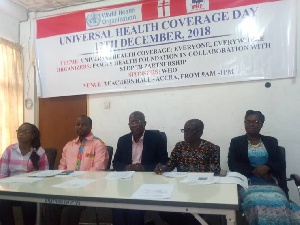A Lecturer in the Department of Population, Family and Reproductive Health, School of Public Health, University of Ghana, Legon, Professor Augustine Ankomah, has encouraged patients to demand explanations from their Doctors or other health professionals in respect to their medial reports.
According to him every patient has the right to know or given a copy of their medical report/confidential information but he was quick to add that, there may be some limitations in the interest of the patient (s), stressed the point, “you have the right to seek the second opinion from another physician and no Doctor will object it.”
Speaking at a day roundtable discussion on the 2018 Day of Universal Health Coverage (UHC) organized by The Family Health Foundation (FHF) under the theme: "United Action for Universal Health in Ghana", in Accra, Professor Ankomah charged patients to voice out any misconduct meted out to them at any felicity for redress.”
He said, “you can use the social media like The Facebook to talk about it in order to expose The Nurse or The Doctor if he or she treated you badly”.
On his part, an HIV Heart-to-Heart Ambassador, the Rev. John Azumah with Hope International Ministry, has appealed to his colleagues in The Ministry to seek regular medical attention in order to avert early death.
He told the gathering that, “Pastors must also seek medical attention because our body is for the earth.”
Rev Azumah however, proposed that men (Husbands) also must be compelled to undergo a mandatory HIV AIDS test as in the cause of pregnant women (the wives).
Reiterating the core message from The Universal Health Coverage, a representative from The UNAIDS, Dr. Jane Okrah said “though the government of Ghana has made significant strides in Health care delivery, there are still challenges which affect the ability of majority of Ghanaians to have access to quality promotive, preventive, curative, rehabilitative and palliative health services they need.”
She mentioned that “this is reflected in high levels of key communicable and non-communicable diseases like Malaria, HIV Tuberculosis, Maternal mortality and Cancers. FHF will undertake a roundtable moderated discussion on the role of various stakeholders to address UHC in Ghana.”
Universal Health Coverage Day is celebrated annually on December 12 and is promoted by the World Health Organization.
December 12 is the anniversary of the first unanimous United Nations resolution calling for all nations to provide for their citizens affordable, quality health care.
UHC is promoted as an instrument to help advance the more broadly conceived human right to health, which is based upon a number of international agreements, or widely-affirmed international documents.
Universal health coverage has been included in the new Sustainable Development Goals for 2015-2030, adopted by the United Nations. In many nations, inclusive healthcare is very rudimentary and does not include heroic interventions or long-term care. Water Aid reports that national infrastructure in many nations cannot support first world healthcare delivery mechanisms because it may not even provide potable water, let alone electricity.
A major WHO and UNICEF survey in 2015 reported that 38% of healthcare facilities surveyed did not have access to a basic water source, and 35% lacked the materials necessary for people to wash their hands effectively. When healthcare workers can’t keep facilities clean and prevent infections, their ability to deliver safe, effective, and dignified care is undermined.
The WASH Initiative (Water, sanitation, and hygiene in healthcare facilities) of the WHO and UNICEF - and their global partners is part of the UN's Global Action Plan "to ensure that all health care facilities in all settings have adequate water, sanitation and hygiene services by 2030.
General News of Monday, 17 December 2018
Source: Edzorna Francis Mensah













